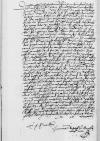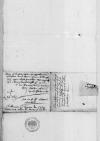Wie ich negst den XII und jungst den XV(e)n tag dis monts E(wer) F(urstlichen) D(urchlauch)t cf. Ioannes DANTISCUS to Albrecht I von Hohenzollern-Ansbach Heilsberg (Lidzbark Warmiński), 1538-05-12, CIDTC IDL 5196;
Ioannes DANTISCUS to Albrecht I von Hohenzollern-Ansbach Heilsberg (Lidzbark Warmiński), 1538-05-15, CIDTC IDL 5197⌊geschrib(e)ncf. Ioannes DANTISCUS to Albrecht I von Hohenzollern-Ansbach Heilsberg (Lidzbark Warmiński), 1538-05-12, CIDTC IDL 5196;
Ioannes DANTISCUS to Albrecht I von Hohenzollern-Ansbach Heilsberg (Lidzbark Warmiński), 1538-05-15, CIDTC IDL 5197⌋, / das ich mich besorgt, / mein bitten(n) an Sigismund I Jagiellon (Zygmunt I) (*1467 – †1548), King of Poland and Grand Duke of Lithuania (1506-1548); Duke of Głogów (Glogau) (1499-1506), Duke of Opava (1501-1506), Governor of Silesia (1504-1506); son of King Kazimierz IV Jagiellon and Elisabeth of Austria⌊ko(niglich)e m(aieste)tSigismund I Jagiellon (Zygmunt I) (*1467 – †1548), King of Poland and Grand Duke of Lithuania (1506-1548); Duke of Głogów (Glogau) (1499-1506), Duke of Opava (1501-1506), Governor of Silesia (1504-1506); son of King Kazimierz IV Jagiellon and Elisabeth of Austria⌋ wurde nicht erhort, / so ists geschen(n). / Im mitwoch vorgangen(n)[1] sein mir durch ein kemerer von(n) Sigismund I Jagiellon (Zygmunt I) (*1467 – †1548), King of Poland and Grand Duke of Lithuania (1506-1548); Duke of Głogów (Glogau) (1499-1506), Duke of Opava (1501-1506), Governor of Silesia (1504-1506); son of King Kazimierz IV Jagiellon and Elisabeth of Austria⌊ko(nigliche)r m(aieste)tSigismund I Jagiellon (Zygmunt I) (*1467 – †1548), King of Poland and Grand Duke of Lithuania (1506-1548); Duke of Głogów (Glogau) (1499-1506), Duke of Opava (1501-1506), Governor of Silesia (1504-1506); son of King Kazimierz IV Jagiellon and Elisabeth of Austria⌋ cf. Sigismund I Jagiellon to Ioannes DANTISCUS Cracow, 1538-05-17, CIDTC IDL 5692⌊briffcf. Sigismund I Jagiellon to Ioannes DANTISCUS Cracow, 1538-05-17, CIDTC IDL 5692⌋ word(en), / dat(um) Cracow (Kraków, Cracovia), city in southern Poland, Małopolska, on the Vistula river, from 1038 capital of the Kingdom of Poland⌊KrakoCracow (Kraków, Cracovia), city in southern Poland, Małopolska, on the Vistula river, from 1038 capital of the Kingdom of Poland⌋, den XVII dits, / in welch(e)n mir ir m(aieste)t gnediglich befolen(n), ane vorczug uff zu sein noch Wrocław (Breslau, Vratislavia), city in southwestern Poland, on the Oder river, historical capital of Silesia, from 1526 ruled by the Habsburgs⌊BreslaWrocław (Breslau, Vratislavia), city in southwestern Poland, on the Oder river, historical capital of Silesia, from 1526 ruled by the Habsburgs⌋, / do hin Ferdinand I of Habsburg (*1503 – †1564), from 1521 Archduke of Austria, from 1526 King of Bohemia and Hungary, Croatia and Slavonia as Ferdinand I, 1531-1558 King of the Romans, 1558-1564 Holy Roman Emperor; son of Philip I the Handsome and Joanna the Mad of Castile, a younger brother of Charles V of Habsburg⌊ro(misch)e ko(niglich)e m(aieste)tFerdinand I of Habsburg (*1503 – †1564), from 1521 Archduke of Austria, from 1526 King of Bohemia and Hungary, Croatia and Slavonia as Ferdinand I, 1531-1558 King of the Romans, 1558-1564 Holy Roman Emperor; son of Philip I the Handsome and Joanna the Mad of Castile, a younger brother of Charles V of Habsburg⌋ im tage der hy(m)melfart Christi[2] sol komen(n), / und sol meinen(n) collegam, den(n) h(e)rn Jan Latalski (*1463 – †1540), brother of Janusz Latalski, Voivode of Poznań; 1495-1525 Canon of Poznań, 1498-1505 Chancellor to Elizabeth of Austria, Queen of Poland; 1500-1525 Provost of the Gniezno Chapter, 1503-1525 Provost of the Cracow Chapter, 1504-1524 royal secretary, 1523-1525 Provost at the Poznań Chapter, 1525-1536 Bishop of Poznań, 1536-1537 Bishop of Cracow, 1537-1540 Archbishop of Gniezno (PSB 16, p. 562)⌊LatalskiJan Latalski (*1463 – †1540), brother of Janusz Latalski, Voivode of Poznań; 1495-1525 Canon of Poznań, 1498-1505 Chancellor to Elizabeth of Austria, Queen of Poland; 1500-1525 Provost of the Gniezno Chapter, 1503-1525 Provost of the Cracow Chapter, 1504-1524 royal secretary, 1523-1525 Provost at the Poznań Chapter, 1525-1536 Bishop of Poznań, 1536-1537 Bishop of Cracow, 1537-1540 Archbishop of Gniezno (PSB 16, p. 562)⌋, posnisch(e)n woywod(en), zu Poznań (Posen, Posnania), city in west-central Poland, Wielkopolska, on the Warta river⌊PosenPoznań (Posen, Posnania), city in west-central Poland, Wielkopolska, on the Warta river⌋ finden(n), / do bey angeczeigt, das ro(misch)e ko(niglich)e m(aieste)t nicht lange zu Bresla, / von wegenn(n) des zcogs wider den Suleiman the Magnificent (*1494 – †1566), 1520-1566 Sultan of the Ottoman Empire⌊Turken(n)Suleiman the Magnificent (*1494 – †1566), 1520-1566 Sultan of the Ottoman Empire⌋, / muge vorczyhen(n), / hir umb ich mich hab den vorschinen freitag[3] von(n) Heilsberg (Lidzbark Warmiński, Heilsberga), town in Ermland (Warmia), the main seat of the bishops of Ermland⌊HeilsbergHeilsberg (Lidzbark Warmiński, Heilsberga), town in Ermland (Warmia), the main seat of the bishops of Ermland⌋ uff gemacht, / und bin im nhamen(n) Gots im zcoge. Und wie ich hie her(r) gelangt, / hab ich den wirdigen(n) h(e)rn Achatius Trenck (†1551), in the thirties Trenck was one of Dantiscus’ friends and supported his efforts to obtain the Ermland bishopric after the death of Mauritius Ferber; from 1523 Canon of Ermland (Warmia); 1544-1545 Chancellor of the Ermland Chapter; from 1545 its Dean; 1533-1546 administrator of the Chapter’s estates in Allenstein (Olsztyn); in 1548 and 1550 General Administrator of the Ermland bishopric (after the deaths of Ioannes Dantiscus and Tiedemann Giese) (KOPICZKO 2, p. 332; SBKW, p. 255-256)⌊Achaciu(m) von der TrenkAchatius Trenck (†1551), in the thirties Trenck was one of Dantiscus’ friends and supported his efforts to obtain the Ermland bishopric after the death of Mauritius Ferber; from 1523 Canon of Ermland (Warmia); 1544-1545 Chancellor of the Ermland Chapter; from 1545 its Dean; 1533-1546 administrator of the Chapter’s estates in Allenstein (Olsztyn); in 1548 and 1550 General Administrator of the Ermland bishopric (after the deaths of Ioannes Dantiscus and Tiedemann Giese) (KOPICZKO 2, p. 332; SBKW, p. 255-256)⌋, meins capitels zu Allenstein (Olsztyn), city on the Łyna river in southern Ermland (Warmia), Allenstein castle was the seat of the administrator of the Ermland Chapter estate⌊AllensteinAllenstein (Olsztyn), city on the Łyna river in southern Ermland (Warmia), Allenstein castle was the seat of the administrator of the Ermland Chapter estate⌋ landprobst, gefunden(n), / der sich williglich erbot(e)n, / die weil ich zu Heilsberg (Lidzbark Warmiński, Heilsberga), town in Ermland (Warmia), the main seat of the bishops of Ermland⌊HeilsbergHeilsberg (Lidzbark Warmiński, Heilsberga), town in Ermland (Warmia), the main seat of the bishops of Ermland⌋ in der eil / nicht zceit het zu schreiben(n), / disses an E(wer) F(urstliche) D(urchlauch)t durch seinen(n) bruder ane seumniss zu bestellen(n), / der ich nicht wil vorhalten(n), / das ich in meiner(r) instruction an Ferdinand I of Habsburg (*1503 – †1564), from 1521 Archduke of Austria, from 1526 King of Bohemia and Hungary, Croatia and Slavonia as Ferdinand I, 1531-1558 King of the Romans, 1558-1564 Holy Roman Emperor; son of Philip I the Handsome and Joanna the Mad of Castile, a younger brother of Charles V of Habsburg⌊ro(misch)e ko(niglich)e m(aieste)tFerdinand I of Habsburg (*1503 – †1564), from 1521 Archduke of Austria, from 1526 King of Bohemia and Hungary, Croatia and Slavonia as Ferdinand I, 1531-1558 King of the Romans, 1558-1564 Holy Roman Emperor; son of Philip I the Handsome and Joanna the Mad of Castile, a younger brother of Charles V of Habsburg⌋ find beschriben(n) den artikel, / E(wer) F(urstliche) D(urchlauch)t und die kay(serlich)e acht betreffend, / mit gutter tinten, / durch den in Got negst vorstorben(n) h(e)rn Jan Chojeński (*1486 – †1538), 1523 royal secretary, 1526-1537 Grand Secretary; 1531-1535 Bishop of Przemyśl, 1535-1537 Bishop of Płock, 1537-1538 Bishop of Cracow, 1537-1538 Grand Chancellor of the Crown (WYCZAŃSKI 1990, p. 248-249; PSB 3, p. 396-399)⌊bischove von(n) KrakoJan Chojeński (*1486 – †1538), 1523 royal secretary, 1526-1537 Grand Secretary; 1531-1535 Bishop of Przemyśl, 1535-1537 Bishop of Płock, 1537-1538 Bishop of Cracow, 1537-1538 Grand Chancellor of the Crown (WYCZAŃSKI 1990, p. 248-249; PSB 3, p. 396-399)⌋ / angeseczt, / dar an ich fast ein grossen(n) wolgefallen(n) gehabt / und mein(n)em erbitten(n) noch, / mich mit meinem(m) Jan Latalski (*1463 – †1540), brother of Janusz Latalski, Voivode of Poznań; 1495-1525 Canon of Poznań, 1498-1505 Chancellor to Elizabeth of Austria, Queen of Poland; 1500-1525 Provost of the Gniezno Chapter, 1503-1525 Provost of the Cracow Chapter, 1504-1524 royal secretary, 1523-1525 Provost at the Poznań Chapter, 1525-1536 Bishop of Poznań, 1536-1537 Bishop of Cracow, 1537-1540 Archbishop of Gniezno (PSB 16, p. 562)⌊collegaJan Latalski (*1463 – †1540), brother of Janusz Latalski, Voivode of Poznań; 1495-1525 Canon of Poznań, 1498-1505 Chancellor to Elizabeth of Austria, Queen of Poland; 1500-1525 Provost of the Gniezno Chapter, 1503-1525 Provost of the Cracow Chapter, 1504-1524 royal secretary, 1523-1525 Provost at the Poznań Chapter, 1525-1536 Bishop of Poznań, 1536-1537 Bishop of Cracow, 1537-1540 Archbishop of Gniezno (PSB 16, p. 562)⌋ der gestalt hirinne halten(n), / das, / wie ich hoffe, / E(wer) F(urstlichen) D(urchlauch)t un(n)d uns allen(n) muge furderlich gedint werden(n). / Es sol ouch an meinem(m) fleiss und treuherczig(en) gemuet zu E(wer) F(urstlichen) D(urchlauch)t, / so vil mir u(m)mer muglich, / nichts abghen(n), / welchs ich freundinstlicher(r) maynung nicht hab mugen(n) E(wer) F(urstlichen) D(urchlauch)t bergen(n), / in der gunst ich mich und mein arme herschafft mit den(n) meynen(n), / wie meinem(m) freundlich(e)n, lieben(n) h(e)rn und nachparn(n), mit hohem fleis thu befelen(n).
 GStA PK, HBA, C1, No 506 2 unnumbered
GStA PK, HBA, C1, No 506 2 unnumbered  GStA PK, HBA, C1, No 506 1 unnumbered
GStA PK, HBA, C1, No 506 1 unnumbered 
